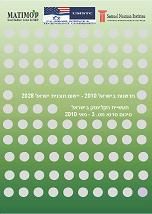On 20 June 2010 a third workshop was held on “leveraging innovation to build and strengthen Israel’s cleantech industry” at Tel – Aviv. The workshop lasted four hours and was attended by invitation of about 40 people deeply involved in Israel’s cleantech industry.
The workshop had three parts: At the first – the Cleantech Project Leader, Elad Shaviv, presented the achievements of the previous workshop and defined the purpose of the present: The industry needs analysis from four aspects: knowledge development, financing, developing the local market and developing the international market – Understanding the challenges and obstacles on the way and proposing ways to overcome these barriers in a comprehensive policy on one hand while practical steps on the other. At the second phase the suggestions are to be prioritized on two axes: feasibility Vs. Impact. The project chairperson, Dr. Gili Fortuna reminded following the previous workshop, that project will target a non-uniform audience consist of: policy makers, academia hi-tech sector managers.
Workshop guest, Director of the U.S.- Israel Commission – Ann Liebschutz noted that the U.S. government now allocates significant amounts to the cleantech industry, emphasizing the importance of professional cooperation in the field between Israeli and American cleantech industries at various’ ways.
At the second part of the workshop the attendees were divided into working groups according to the four defined areas, led by Chairman elected for each area. The groups held a free discussion enabling each participant to express their opinions and suggestions. At the end of the brainstorming, each group gathered their proposals and prioritized them according to feasibility / impact metrics.
At the third section the groups gathered together to show the discussions results.
Findings: All the teams noted that an active regulatory policy which will be in line with the regulation in developed countries at issues of air quality standards and carbon emissions reductions are a must for the process to be successful.
Such a policy is the key to establishing a local market (as opposed to hi-tech industries where there are infrastructure aspects.)
Regulation on those subjects will enable the industry to focus on R&D and Beta sites as a preparation for exportation, and will improve the employment cycle and strengthen the traditional industries. Another issue mentioned by the teams is the need for a central body within the government which will map and prioritize the industry areas, as well as matching criteria to the cleantech time scales. Third issue which was raised in consensus is the need to increase the budget and its assignment to preferred areas.












